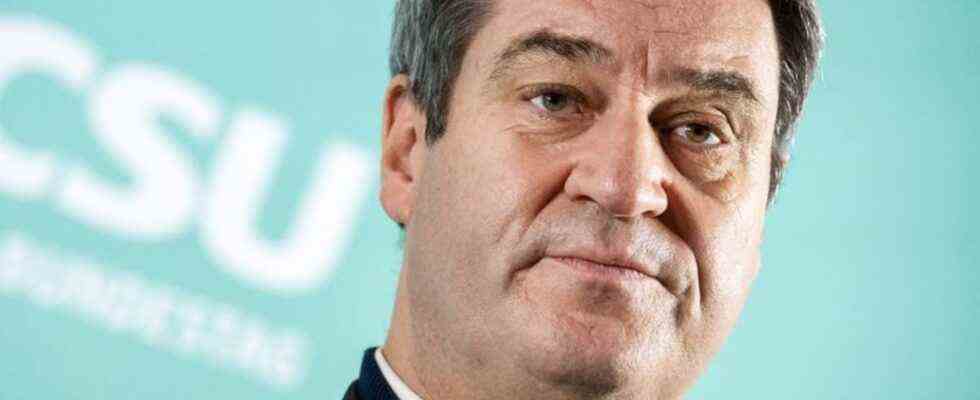corona pandemic
Söder does not want to implement compulsory vaccination for nursing staff
Markus Söder, Prime Minister of Bavaria and Chairman of the CSU, announces corona easing. Photo: Bernd von Jutrczenka/dpa
© dpa-infocom GmbH
Prime Minister Markus Söder takes his foot off the gas in the fight against Corona – until further notice there should be no vaccination for nursing staff in Bavaria. The SPD speaks of a “fatal signal”.
According to Prime Minister Markus Söder (CSU), Bavaria does not want to implement the corona vaccination requirement for healthcare workers until further notice.
There will be “the most generous transitional regulations”, which “de facto initially amounts to a suspension of enforcement,” said the CSU chairman after a video switch of the CSU board in Munich. “For how many months will we see,” he added – at least for a while, “to make the whole thing sensible”.
The CDU is demanding that the federal government suspend compulsory vaccination for staff in medical and nursing facilities throughout Germany. That was the “very unanimous opinion of the Presidium and Federal Executive Committee of the CDU,” said party leader Friedrich Merz at the CDU/CSU parliamentary group chairmen’s conference in Saarbrücken. After consultations, it became apparent: “The government leaves the facilities and the employees completely alone with the consequences of this compulsory vaccination,” said Merz.
“Fatal signal”
Federal Health Minister Karl Lauterbach has criticized Bavaria’s announcement. “Lax enforcement rules for institution-related vaccinations can not only endanger the lives of older people with weak immune systems,” said the SPD politician. “In addition, they also endanger the credibility of politics.” It’s about protecting patients and residents. “The Bavarian state government should also take the law that has been passed seriously,” warned Lauterbach.
The Bavarian government is thwarting the joint decision by the federal and state governments and the law broadly supported by the CDU/CSU, said the health policy spokeswoman for the SPD parliamentary group, Heike Baehrens. The aim of the facility-related vaccination requirement is to protect particularly vulnerable people. “If the CSU suspends the obligation to vaccinate, it is evading its responsibility to ensure this protection. That sends a fatal signal.”
“Instead of slowing down now, everything must be done by countries and employers to convince staff in the health and care sector to vaccinate,” said Baehrens. “You should make specific vaccination offers on site, for example with the Novavax protein vaccine that will be available soon.” There is hope that vaccination skeptics will have fewer reservations than with the mRNA vaccines from Biontech or Moderna.
Criticism also comes from the German Hospital Society. Despite Söder’s statements, nothing changes for the hospitals, said CEO Gerald Gass of the “Augsburger Allgemeine”. The announcement does not exempt the clinics from complying with the law. “We are obliged to report unvaccinated employees to the health authorities by March 15th. We are prepared for this and we will carry it out.”
Söder for a general corona vaccination
Basically, Söder pleaded again for a general corona vaccination – he very much hopes that there will be a “wise decision” here. On the other hand, he is now critical of the obligation to vaccinate only for employees in the medical and nursing sector: is no longer an effective means of accompanying or dampening or stopping the current omicron wave.”
Significant loosening promised
On the other hand, there should be further relaxation of the corona measures in Bavaria. Football, hairdressers and restaurants: Söder believes that the stable situation in Bavaria’s intensive care units, despite the further increase in corona numbers, should lead to a significant relaxation of the control measures.
As the German Press Agency learned from participants, he made appropriate suggestions on Monday when the CSU board of directors broadcast video.
Decisions on this could be made in the cabinet as early as Tuesday. “We only have a third of the occupancy of the intensive care beds as we had in the fourth wave of Delta,” said Söder on Monday in the ZDF morning magazine. “And that’s the important thing.” Restrictions are correct when the health system is under extreme strain. “But this is currently not the case with Omikron.”
Curfew is gone
According to Söder’s proposals, the current 10 p.m. curfew for restaurants should be lifted. In restaurants where food is offered, guests can sit longer again. At sporting events, a spectator capacity of up to 50 percent should be allowed again – in stadiums and at major sporting events, the limit is currently 25 percent. In addition, according to Söder, a maximum upper limit of 15,000 spectators should then apply, currently it is 10,000.
For cultural events, an occupancy rate of up to 75 percent should again be possible, currently it is a maximum of 50 percent. In both areas, however, the 2G plus rule and FFP2 mask requirement should remain.
Body-related services such as hairdressers or nail salons should also be possible again in Bavaria for visitors with a negative corona test. The 3G rule should apply here again. This means that people who have not been vaccinated or who have no proof of recovery can use the services again. The 2G rule still applies here.
Söder had already campaigned for easing at the weekend. “The consistent use of FFP2 masks allows the withdrawal of contact restrictions,” wrote Söder on Facebook on Sunday. “The federal government must submit a phased plan for this.” The prerequisite is that the clinics are not overloaded.

